For Her, With Her is a podcast by Women’s Legal Service QLD, created to inform, support, and empower women navigating domestic and family violence, family law, and complex legal systems. Each episode features real conversations with legal experts, advocates, and women with lived experience—breaking down the law into clear, practical guidance. Whether you’re seeking support, working in the sector, or want to better understand the issues affecting women across Queensland, this series offers thoughtful, trauma-informed insight grounded in decades of frontline experience.
Note: This podcast provides general information only and does not constitute legal advice. If you need personalised legal support, contact Women’s Legal Service Queensland or a qualified professional. Thank you to the Pekol Family for making the podcast possible.

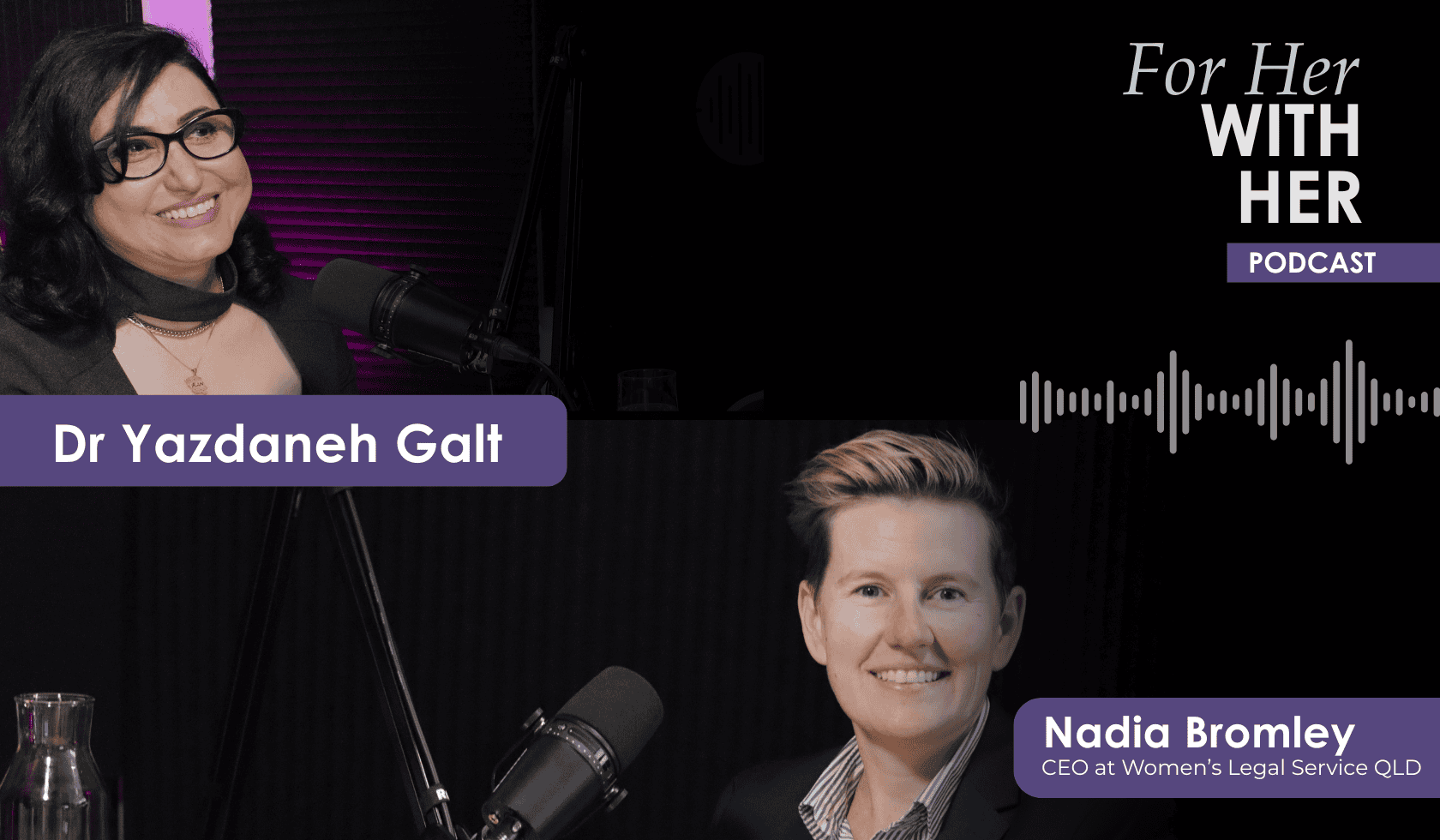
In this deeply moving episode of For Her, With Her, we speak with Dr. Yazdaneh Amiryazdani Galt, who shares her courageous journey of escaping domestic violence, navigating complex legal and immigration systems, and rebuilding her life in Australia. Originally from Iran, Yazdaneh speaks candidly about the barriers she faced, from cultural isolation to legal hurdles, and how knowledge, planning, and the support of community and legal services helped her reclaim her future. Today, she is an accomplished audiologist, business owner, and proud mother, whose story inspired the Oscar-nominated film Shayda, directed by her daughter Noora Niasari. Yazdaneh reminds us that help is not charity, it’s a right, and shares her hard-won insights for women thinking about leaving violence. She also shares her hopes for a future where no woman has to risk everything to live free from fear.
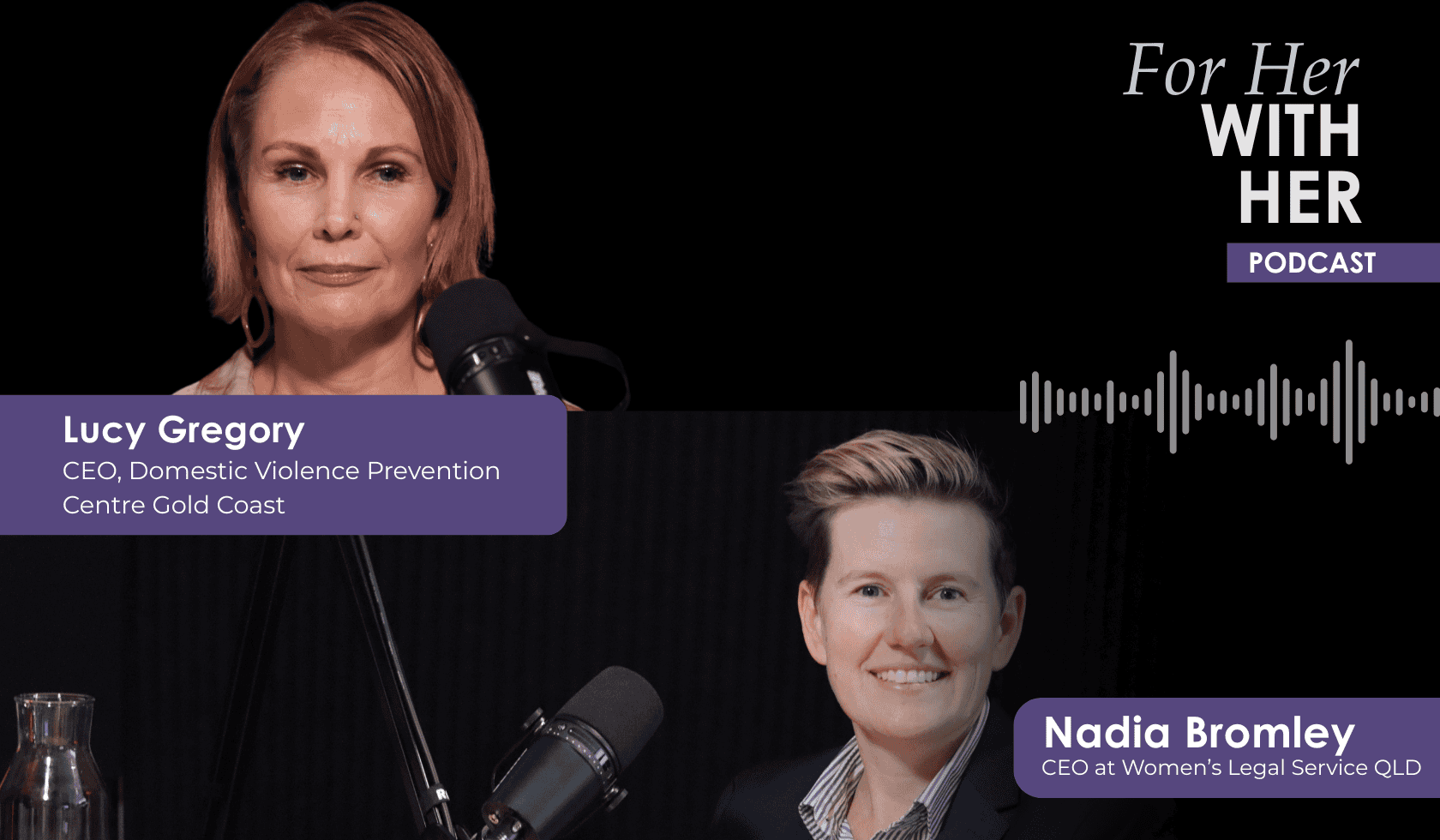
In this episode of For Her, With Her, we tackle a crucial but often overlooked part of preventing violence: how we hold people who use violence to account. Lucy Gregory, CEO of Domestic Violence Prevention Centre (DVPC), joins us to unpack how accountability goes beyond the justice system. Lucy reflects on why language matters when talking about people who use violence and how we can support men to step into healthier, safer versions of masculinity. We also discuss how programs, like those provided by SPEAQ and Men’s Line Australia, support men to take responsibility and discuss the barriers that still exist, including a lack of investment in prevention programs, as well as culturally safe, community-led responses for First Nations and diverse communities. Lucy shares her hopes for a future where equality is the norm, and where services like hers are no longer needed.
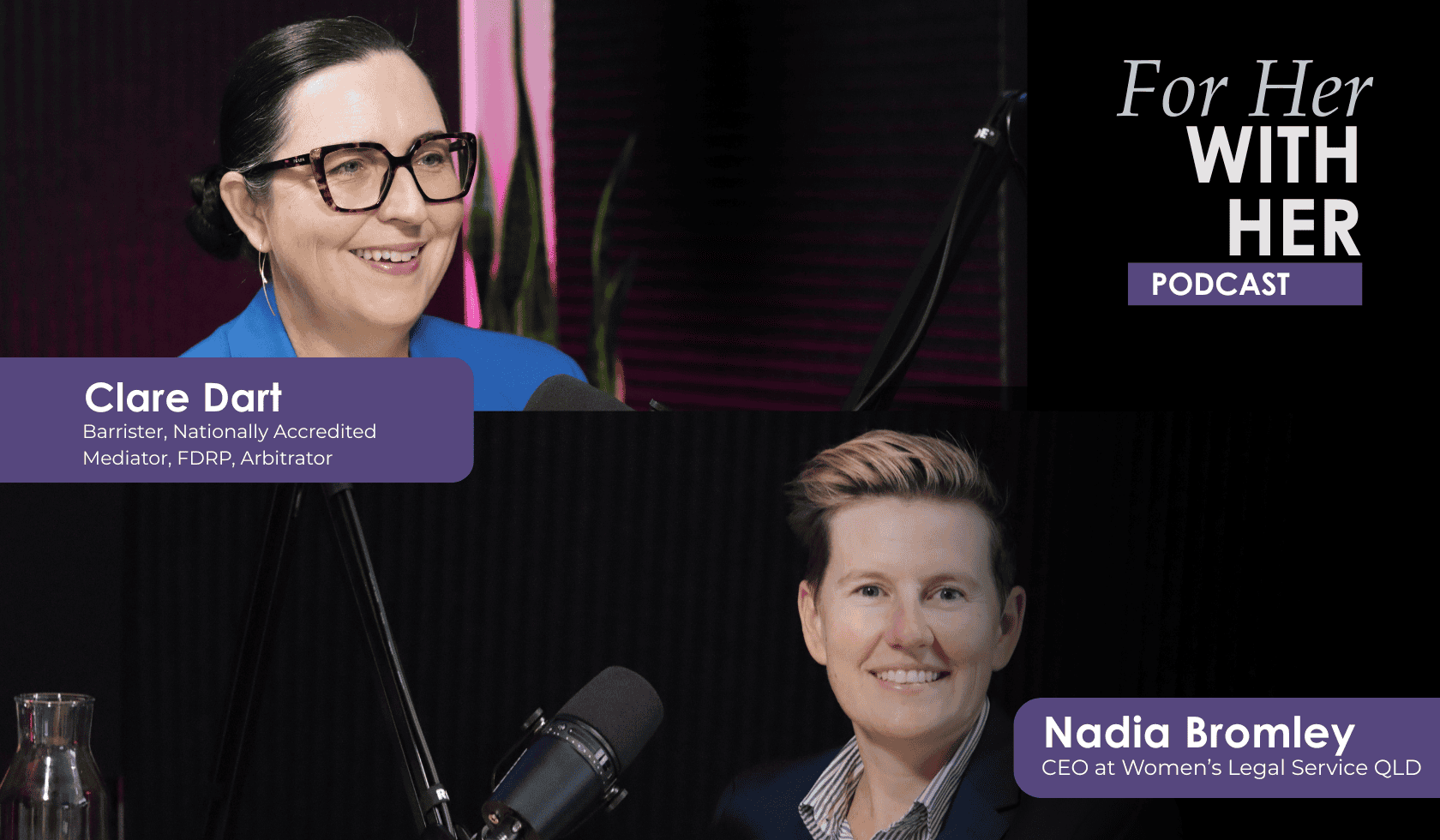
In this episode of For Her, With Her, we sit down with Barrister Clare Dart to explore the complexities of parenting after separation. Practising in family law, child protection, and domestic violence since 1997, Clare unpacks the key legal pathways for parenting arrangements, including recent amendments to the Family Law Act. We also debunk common myths, like the belief in a ‘magic age’ where children can decide, or that equal time is always the default. Clare explains the role of mediation, including how it has evolved into a safer and more accessible process for victim-survivors, and why it often results in better outcomes than court battles. We break down what to expect if court becomes necessary, the importance of gathering evidence and thinking about long-term parenting needs. We also discuss the importance of early legal advice and the support that’s available through services like Women’s Legal Service Queensland.
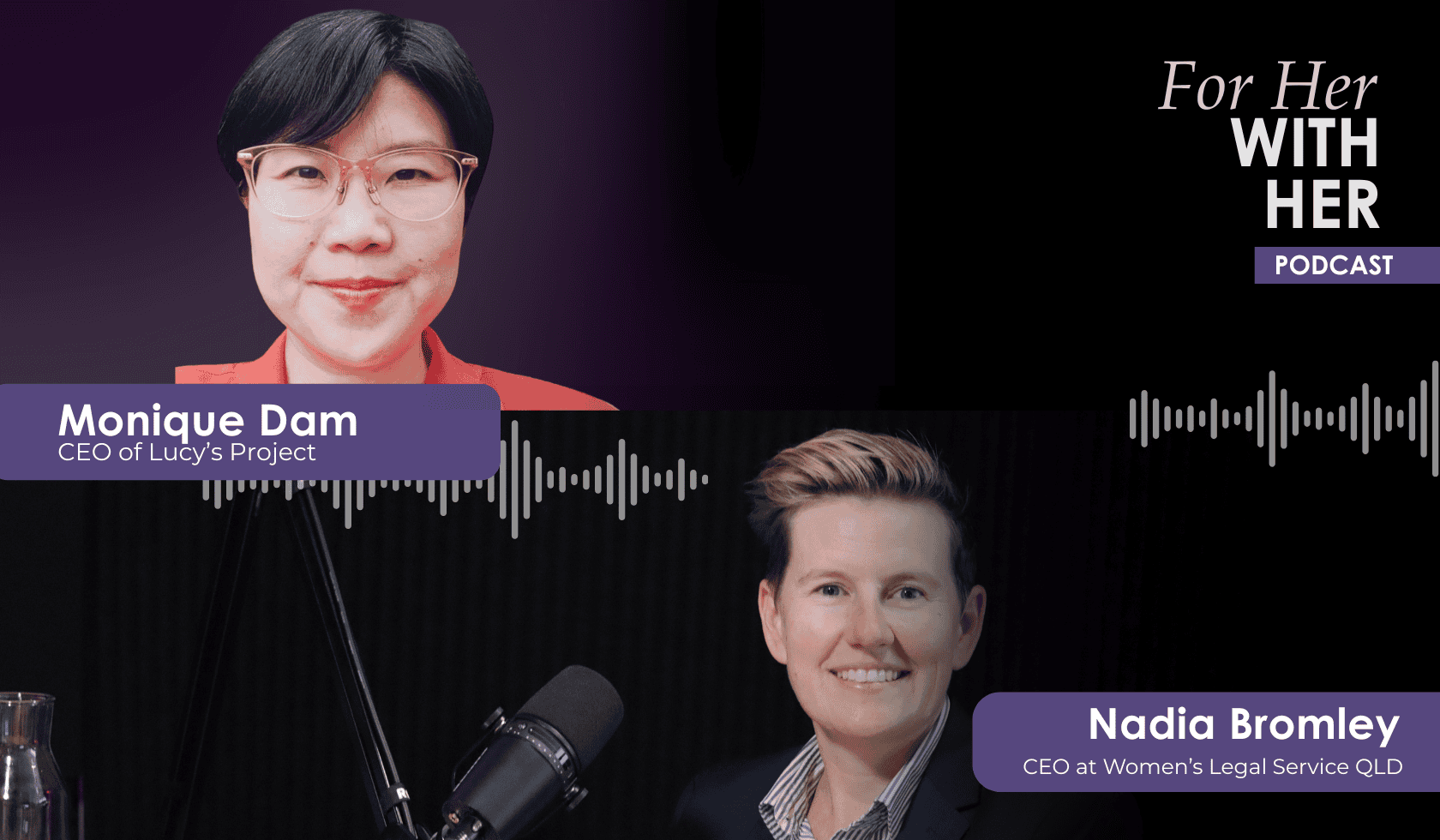
In this episode of For Her, With Her, we chat with Monique Dam, CEO of Lucy’s Project, to explore the link between domestic and family violence and animal abuse. Monique explains how perpetrators use threats or harm to animals as a tool of control, preventing victim-survivors seeking safety. We explore the barriers that make it harder for women to escape violence with their animals and the growing movement to make shelters, refuges, and housing more animal-inclusive. We discuss how animals are finally being recognised in legal frameworks (such as the recently amended Family Law Act) and why services like Pets in Crisis are critical lifelines for families in Queensland. We also discuss how the community, including veterinarians and frontline services,can help by recognising animal abuse as a red flag for domestic violence.
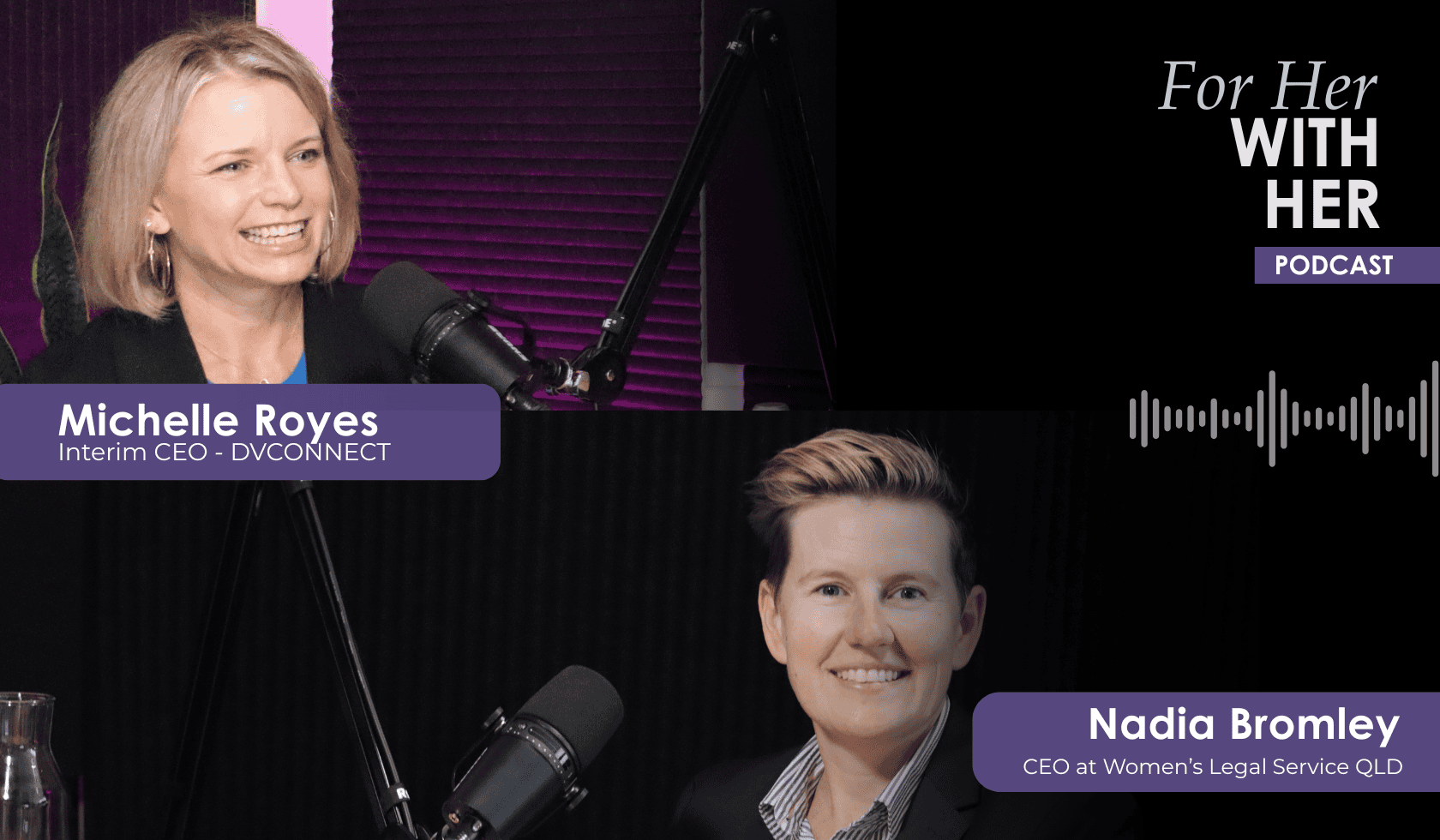
In this episode of For Her, With Her, we talk to Michelle Royes, Interim CEO of DVConnect, to explore the realities of separation and safety for women experiencing domestic and family violence. Michelle explains why separation is often the most dangerous time and why leaving isn’t always the safest option for everyone. We unpack why statements like ‘why doesn’t she just leave?’ can do more harm than good, and why we need to reframe conversations around supporting victim-survivors to make their safest next choice, in their own time. Michelle shares how services like DVConnect offer state-wide, trauma-informed support for women, children, men and pets (Pets in Crisis program), and why friends and family play a critical role in listening without judgement. We also discuss why stopping the cycle of abuse is the responsibility of the whole community, and why services like Men’s Line Australia are essential to creating safer futures for all.

In this episode of For Her, With Her, we’re joined by Buffy Kerekes and Ersi Scarman from The Zahra Foundation to shine a light on financial abuse. One of the most common yet least understood forms of domestic and family violence, Buffy and Ersi share common experiences they hear from the women they work with, exposing how financial abuse can trap survivors and continue long after a relationship ends. We discuss the systemic barriers victim-survivors face, the emotional toll of financial abuse, and how services like The Zahra Foundation’s free, trauma-informed financial counselling programs and Financial Empowerment Checklist can help women regain control and confidence.
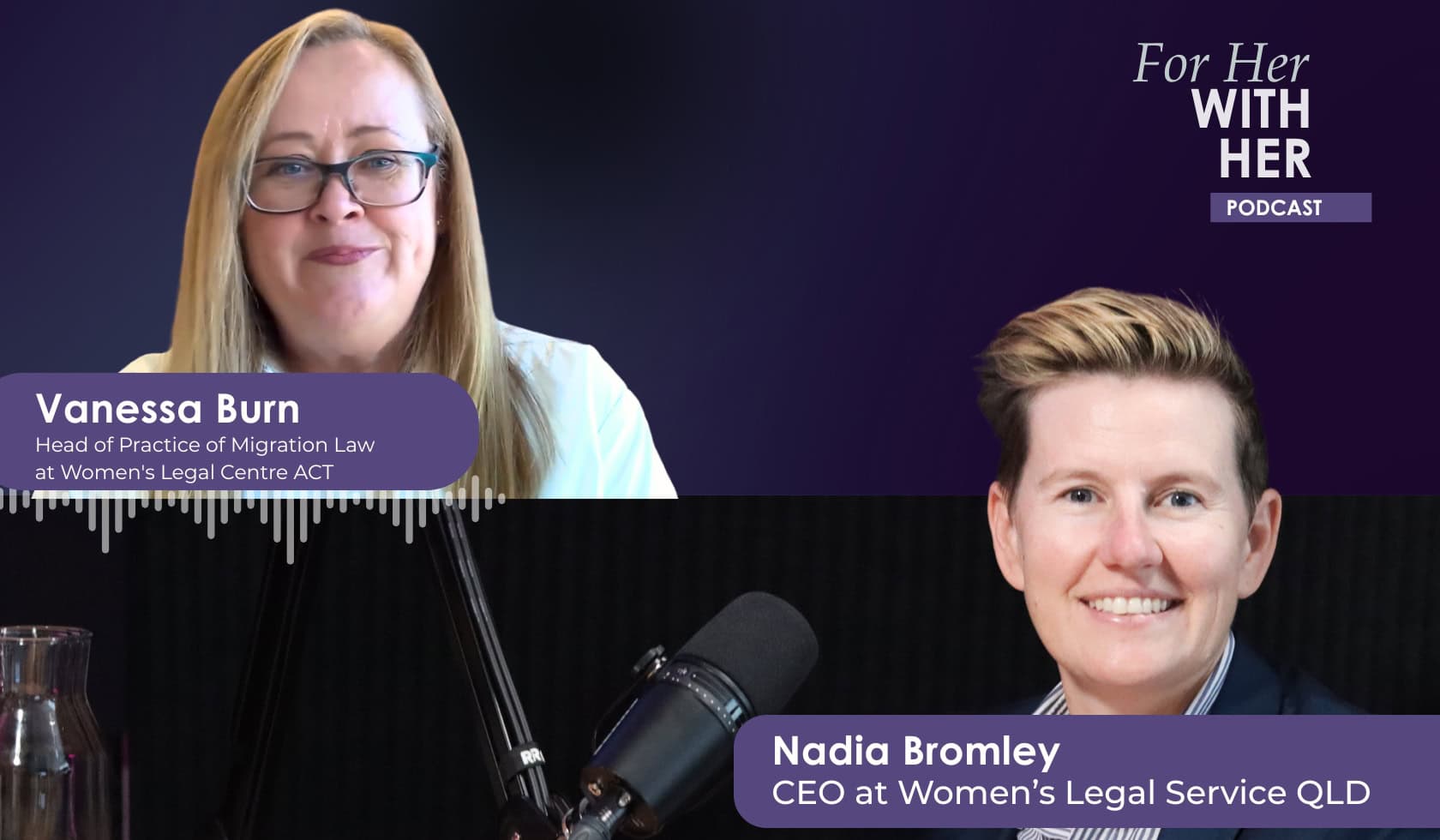
In this episode of For Her, With Her, we are joined by Vanessa Burn, Head of the Migration Law Practice at Women’s Legal Centre ACT, to explore how domestic and family violence intersects with Australia’s migration system. Vanessa shares how women on temporary visas are particularly vulnerable to coercive control and manipulation, often fearing deportation or losing their children if they seek help. We unpack myths around migration, visas, and legal rights, including the misconception that you must be a citizen to access services like Women’s Legal Service Queensland or Australia’s network of Community Legal Centres. Vanessa also explains the critical importance of early legal advice, the expansion of family violence provisions across more visa types, and the urgent need for system reform, including a dedicated family violence visa pathway.

In this episode of For Her, With Her, we are joined by Penney Ferguson, CEO of the First Nations Women’s Legal Service Queensland (FNWLSQ), to discuss the unique challenges First Nations women face when experiencing domestic and family violence. Penney shares her own story and the experiences of her community, highlighting how systemic discrimination, racism, and geographical isolation can create additional barriers to safety and justice. We also discuss why First Nations women’s voices and leadership must become a central focus and why listening without judgment is one of the most powerful things we can do to create safer futures for all women.

In this episode of For Her, With Her, we explore the growing threat of technology-facilitated abuse with Dr Freya McLachlan, criminologist and research fellow at Griffith University. From stalking via smartphones to financial and image-based abuse, Dr McLachlan explains how technology is increasingly weaponised by perpetrators, and what victim-survivors, bystanders, and the tech industry can do to respond. This is an important conversation about safety in an ever-connected world and why recognising tech abuse as serious, dangerous and pervasive is key to preventing harm.
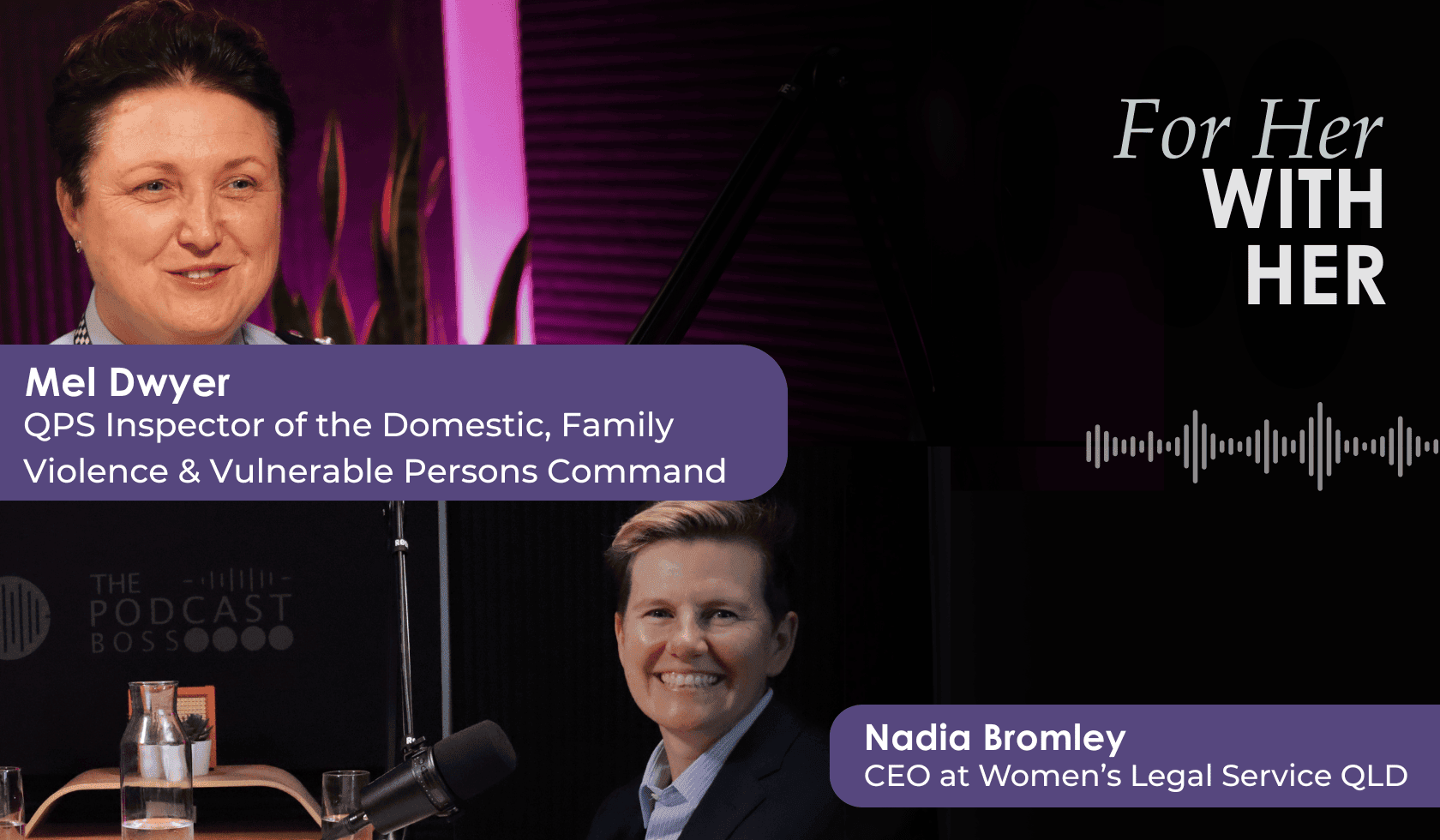
In this episode of For Her, With Her, we’re joined by Inspector Mel Dwyer from the Queensland Police Service to unpack how the legal system responds to domestic and family violence. Inspector Dwyer shares how policing has evolved, what the new coercive control offence means, and why getting the right support, from both police and the community, is so important. It’s a conversation about listening, learning and making sure every woman feels seen, heard and protected.
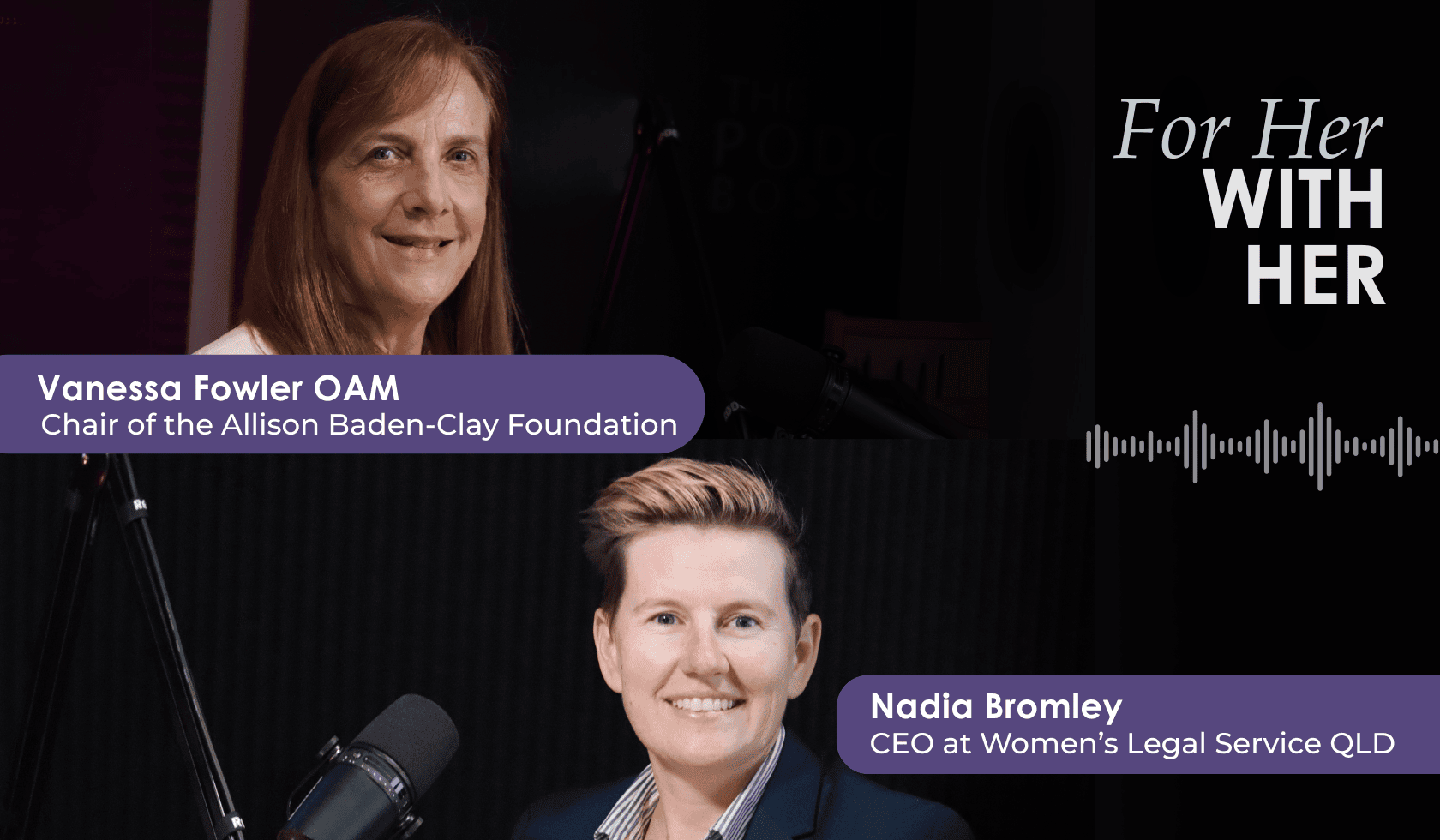
In our first ever episode of For Her, With Her, Vanessa Fowler OAM, Chair of the Allison Baden-Clay Foundation, joins us to discuss how domestic and family violence can present in both visible and hidden ways. Vanessa shares her family’s journey after the loss of her sister Allison, and how recognising early signs of abuse, especially coercive control, can make all the difference. This episode reminds us that domestic violence does not discriminate, and that community education, kindness and bystander action are key to creating safer futures.
WLSQ acknowledges the Traditional Custodians of the lands on which we live and work, particularly the Turrbul, Yuggera, Kabi Kabi/Gubbi Gubbi, Ugarapul peoples and the Yugambeh Language Region on whose lands our offices sit. We recognise their continuing connection to this Country, its waters, and culture. We acknowledge that their sovereignty was never ceded. We pay our respects to Elders, past and present, and we especially honour First Nations women and the traditions they carry.
Available 9:00am to 4:30pm AEST, Monday to Friday
Ending violence against women involves support from the whole community.
If you’re worried someone will find out you visited this website, find information about online safety here.
Click here or press the ‘esc’ key to exit this site quickly.